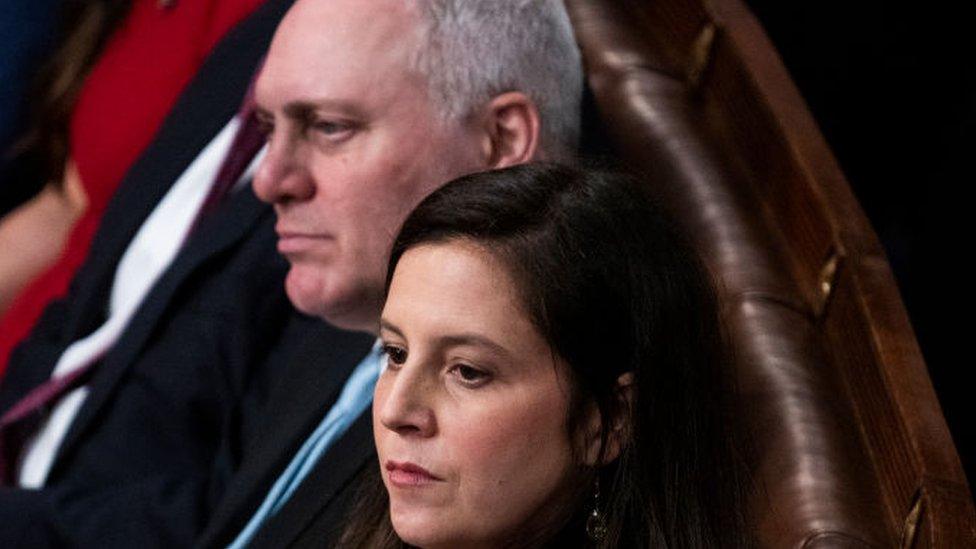If not Kevin McCarthy for US House Speaker, then who else?
- Published

Steve Scalise and Elise Stefanik are the second and third-ranking Republicans in the US House of Representatives
Republican leader Kevin McCarthy has failed to be elected Speaker of the US House of Representatives - but if not him, who else could fill the role?
After multiple consecutive rounds of voting over three long days, Mr McCarthy fell short of the 218 votes he needed to clinch the job.
Until the House has its presiding officer in place, the body is not swearing in its new members or moving on with its legislative business.
The California congressman insists he can eventually win over his detractors, and he remains the favourite to get the famous gavel in his hands.
But as voting continues, other options may become more palatable.
Steve Scalise
The Louisiana congressman, 57, has been Mr McCarthy's deputy since 2019.
Mr Scalise, who is entering his eighth term in the House, survived being shot and wounded by a left-wing extremist while practising for the annual congressional baseball game in 2017.
In an internal Republican Party election this past November, he was elected unopposed by his colleagues for the position of majority leader, the second-highest rank in the House.
On Tuesday, he nominated Mr McCarthy for speaker in the third round of voting, telling his colleagues to come together if they want to "get big things done".
But Matt Rosendale, a Montana congressman who is one of the 20 Republican holdouts blocking Mr McCarthy's bid for speaker, appeared to throw cold water Tuesday on the possibility of a Speaker Scalise. He said neither Mr McCarthy nor anyone who has been in Republican House leadership over the past 10 years were acceptable to him.
Watch: Kevin McCarthy's difficult Tuesday - in 90 seconds
Elise Stefanik
Elected to the House in 2014, Ms Stefanik was the youngest woman elected to Congress at the time, aged 30.
Once the vice-president of Harvard University's prestigious Institute of Politics, the New Yorker won election to the House as a moderate.
But the 38-year-old has veered sharply to the right in recent years, most notably by her outspoken support for Donald Trump.
In May 2021, as Republicans ousted Liz Cheney from leadership over her criticisms of Mr Trump, Ms Stefanik was elected to replace her as chair of the House Republican Conference, making her the fourth highest ranking member of the party. She was re-elected to the position this November.
Ms Stefanik also nominated Mr McCarthy for speaker in Tuesday's first round of voting and was seen taking notes throughout the session.
Other (unlikely) possibilities
The revolt against Mr McCarthy has been led in part by Andy Biggs, an Arizona congressman who is part of the ultra-conservative House Freedom Caucus. Mr Biggs, 64, was nominated by a colleague as an alternative option for Speaker on Tuesday but received only 10 votes, including his own, in the first round.
Another name pitched for Speaker was Representative Jim Jordan, a conservative firebrand from Ohio. Mr Jordan, 58, received only six votes in the first round, but then consolidated support from all of Mr McCarthy's detractors in the next two rounds. But the congressman, who is in line to assume chairmanship of the powerful House Judiciary Committee, insists he does not want the job and spoke in favour of electing Mr McCarthy on Tuesday.
Neither Mr Biggs nor Mr Jordan are seen as lawmakers who could be acceptable to a majority of their colleagues as speaker.
In three successive ballots, all 212 Democrats in the chamber voted for their own leader, New York congressman Hakeem Jeffries. But the likelihood of six Republicans crossing the aisle to support Mr Jeffries as the consensus pick for Speaker is very low.
Candidates for speaker must be nominated by members of the House, but they don't need to be elected lawmakers of the chamber, according to the US Constitution.
The chamber has always elected a House member as speaker, but it has seen nominations of non-House members in the past, including Joe Biden in 2019.
Could we hear a Republican nominate Donald Trump for speaker on Wednesday?